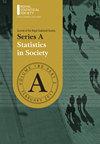A system of population estimates compiled from administrative data only
IF 1.6
3区 数学
Q2 SOCIAL SCIENCES, MATHEMATICAL METHODS
Journal of the Royal Statistical Society Series A-Statistics in Society
Pub Date : 2023-04-25
DOI:10.1093/jrsssa/qnad065
引用次数: 1
Abstract
This paper presents a novel system of annual Population Estimates Compiled from Administrative Data Only (PECADO) for Ireland in the absence of a Central Population Register. The system is entirely based on data originated from administrative sources, so that population estimates can be produced even without purposely designed coverage surveys or a periodic census to recalibrate estimates. It requires several extensions to the traditional Dual System Estimation (DSE) methodology, including a restatement of the underlying assumptions, a trimmed DSE method for dealing with erroneous enumerations in the administrative register, and a test for heterogeneous capture probabilities to facilitate the choice of blocking in applications. The PECADO estimates for years 2011 - 2016 are compared to the Census counts in 2011 and 2016. We demonstrate how the system can be used to investigate the Census 2016 undercount in Ireland, in place of the traditional approach of deploying additional population coverage surveys.仅根据行政数据编制的人口估计系统
本文提出了一种新颖的年度人口估计系统,该系统仅从行政数据(PECADO)为爱尔兰编制,没有中央人口登记。该系统完全基于来自行政来源的数据,因此即使没有特意设计的覆盖范围调查或定期人口普查来重新校准估计数,也可以产生人口估计数。它需要对传统的双系统估计(Dual System Estimation, DSE)方法进行一些扩展,包括对基础假设的重述、用于处理管理寄存器中的错误枚举的精简DSE方法,以及对异构捕获概率的测试,以方便在应用程序中选择阻塞。PECADO对2011年至2016年的估计与2011年和2016年的人口普查数据进行了比较。我们展示了如何使用该系统来调查爱尔兰2016年人口普查的漏数,以取代部署额外人口覆盖调查的传统方法。
本文章由计算机程序翻译,如有差异,请以英文原文为准。
求助全文
约1分钟内获得全文
求助全文
来源期刊
CiteScore
2.90
自引率
5.00%
发文量
136
审稿时长
>12 weeks
期刊介绍:
Series A (Statistics in Society) publishes high quality papers that demonstrate how statistical thinking, design and analyses play a vital role in all walks of life and benefit society in general. There is no restriction on subject-matter: any interesting, topical and revelatory applications of statistics are welcome. For example, important applications of statistical and related data science methodology in medicine, business and commerce, industry, economics and finance, education and teaching, physical and biomedical sciences, the environment, the law, government and politics, demography, psychology, sociology and sport all fall within the journal''s remit. The journal is therefore aimed at a wide statistical audience and at professional statisticians in particular. Its emphasis is on well-written and clearly reasoned quantitative approaches to problems in the real world rather than the exposition of technical detail. Thus, although the methodological basis of papers must be sound and adequately explained, methodology per se should not be the main focus of a Series A paper. Of particular interest are papers on topical or contentious statistical issues, papers which give reviews or exposés of current statistical concerns and papers which demonstrate how appropriate statistical thinking has contributed to our understanding of important substantive questions. Historical, professional and biographical contributions are also welcome, as are discussions of methods of data collection and of ethical issues, provided that all such papers have substantial statistical relevance.

 求助内容:
求助内容: 应助结果提醒方式:
应助结果提醒方式:


